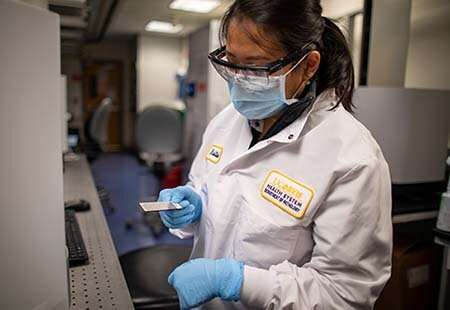New platform uses machine-learning and mass spectrometer to rapidly process COVID-19 tests


UC Davis Health, in partnership with SpectraPass, is evaluating a new type of rapid COVID-19 test. The research will involve about 2,000 people in Sacramento and Las Vegas.
The idea behind the new platform is a scalable system that can quickly and accurately perform on-site tests for hundreds or potentially thousands of people.
Nam Tran is a professor of clinical pathology in the UC Davis School of Medicine and a co-developer of the novel testing platform with SpectraPass, a Las Vegas-based startup.
Tran explained that the system doesn’t look for the SARS-CoV-2 virus like a PCR test does. Instead, it detects an infection by analyzing the body’s response to it. When ill, the body produces differing protein profiles in response to infection. These profiles may indicate different types of infection, which can be detected by machine learning.
“The goal of this study is to have enough COVID-19 positive and negative individuals to train our machine learning algorithm to identify patients infected by SARS-CoV-2,” said Tran.
A study published by Tran and his colleagues earlier this year in Nature Scientific Reports found the novel method to be 98.3% accurate for positive COVID-19 tests and 96% for negative tests.
In addition to identifying positive cases of COVID-19, the platform also uses next-generation sequencing to confirm multiple respiratory pathogens like the flu and the common cold.
The sequencing panel at UC Davis Health can detect over 280 respiratory pathogens, including SARS-CoV-2 and related variants—allowing the study to train the machine-learning algorithms to differentiate COVID-19 from other respiratory diseases.
https://youtube.com/watch?v=Sy2tGAVL2uU%3Fcolor%3Dwhite
So far, the study has not seen any participants with the new omicron variant.
“Our team has tested the system with samples from patients infected delta and other variants of the SARS-CoV-2 virus. We are fairly certain that omicron will be detected as well, but we won’t know for sure until we encounter a study participant with the variant,” Tran said.
The Emergency Department (ED) at the UC Davis Medical Center is conducting the testing in Sacramento. Collection for testing in Las Vegas is conducted at multiple businesses and locations.
The team expects the study will continue until the end of winter. The results from the new study will be used to seek emergency use authorization (EUA) from the Food and Drug Administration.
Testing system builds on MILO
The novel testing system uses an analytical instrument known as a mass spectrometer. It’s paired with machine learning algorithms produced by software called the Machine Intelligence Learning Optimizer or MILO. MILO was developed by Tran, Hooman Rashidi, a professor in the Department of Pathology and Laboratory Medicine, and Samer Albahra, assistant professor and medical director of pathology artificial intelligence in the Department of Pathology and Laboratory Medicine.
As with many other COVID-19 tests, a nasal swab is used to collect a sample. Proteins from the nasal sample are ionized with the mass spectrometer’s laser, then measured and analyzed by the MILO machine learning algorithms to generate a positive or negative result.
In addition to conducting the mass spectrometry testing, UC Davis serves as a reference site for the study, performing droplet digital PCR (ddPCR) tests, the “gold standard” for COVID-19 testing, to assess the accuracy of the mass spectrometry tests.
University-industry partnership formed in 2020
The project originated with Maurice J. Gallagher, Jr., chairman and CEO of Allegiant Travel Company and founder of SpectraPass. Gallagher is also a UC Davis alumnus and a longtime supporter of innovation and entrepreneurship at UC Davis.
In 2020, when the COVID-19 pandemic brought the travel and hospitality industries almost to a standstill, Gallagher began conceptualizing approaches to allow people to gather again safely. He teamed with researchers at UC Davis Health to develop the new platform and launched SpectraPass.
In addition to the novel testing solution, SpectraPass is also developing digital systems to accompany the testing technology. Those include tools to authenticate and track verified test results from the system so an individual can access and use them. The goal is to facilitate accurate, large-scale rapid testing that will help keep businesses and the economy open through the current and any future pandemics.
Source: Read Full Article